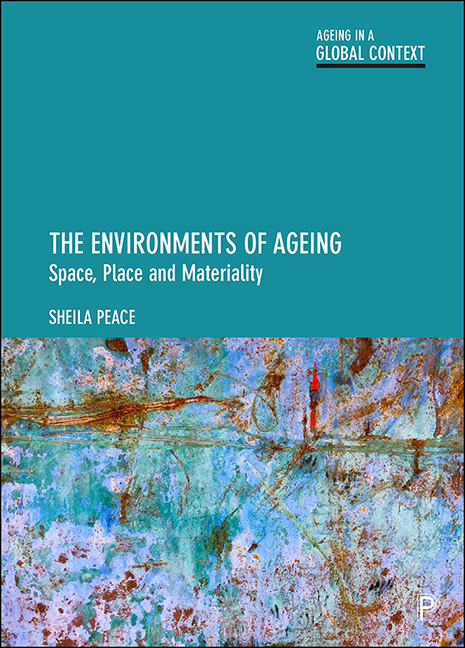Book contents
- Frontmatter
- Dedication
- Contents
- List of figures and tables
- Research summaries
- List of acronyms
- About the author
- Acknowledgements
- Series editors’ preface
- Preface: understanding the structure
- 1 Person and environment
- 2 Theoretical development
- 3 The global context
- 4 Environmental living
- 5 Housing in later life
- 6 Housing histories, housing options
- 7 Alternative environments: specialised housing (with care)
- 8 Care home living: a form of long-term care
- 9 Methodological development
- 10 Rethinking the spatiality of ageing
- Glossary of terms
- References
- Index
10 - Rethinking the spatiality of ageing
Published online by Cambridge University Press: 15 September 2022
- Frontmatter
- Dedication
- Contents
- List of figures and tables
- Research summaries
- List of acronyms
- About the author
- Acknowledgements
- Series editors’ preface
- Preface: understanding the structure
- 1 Person and environment
- 2 Theoretical development
- 3 The global context
- 4 Environmental living
- 5 Housing in later life
- 6 Housing histories, housing options
- 7 Alternative environments: specialised housing (with care)
- 8 Care home living: a form of long-term care
- 9 Methodological development
- 10 Rethinking the spatiality of ageing
- Glossary of terms
- References
- Index
Summary
Introduction
When considering the journey made across different environments of ageing, and the wealth of literature covered, there are many paths and views that could have been taken. The aim of this chapter is to foreground contextual issues central to environmental gerontology. The spatiality of ageing started with a global perspective even if knowledge of person– environment (P–E) interaction is commonly local and national. Here a relational approach is taken to these spatial levels, looking at flows captured at different times through people and place. It returns to global concerns to reassess local and national impact that affects social exclusion and inclusion in later life, a part of the iterative theme of environmental living and the concept of home. In seeking a circularity of ideas with global to local, local to global influence relationality is used as a way to understand environments of ageing.
In Chapter 3, a discussion of global concerns focused on the big issues that are part of this challenging time. Thinking relating to global health focuses not only on definitions of active ageing and the ability of individuals to take personal responsibility for diet, exercise, activity and participation, but also the parallel incidence of long-term chronic ill health and end of life. Such experience varies within and between developed and developing countries where inequalities of personal and social health are related. When writing in October 2021, health for all ages is a chief concern as the COVID-19 pandemic has taken hold globally. By the summer of 2021, the third English national lockdown was coming to an end, with more than two-thirds of the adult population having had two COVID-19 vaccinations and later leading to booster vaccinations. What does this mean for the ways in which we will live in the future? Now, with several vaccines being rolled out at different speeds across the world, will things go back to how they were or will they change for ever – and could they change for the better?
This collective global experience has certainly moved centre stage, while other issues have moved to the wings. However, we are still living in an increasingly unequal world, where climate change continues unabated; there is growing intolerance of refugees and migrants; in the UK, EU withdrawal challenges identities as citizens of supranational collaborations; and technological change continues with benefits for some more than others.
- Type
- Chapter
- Information
- The Environments of AgeingSpace, Place and Materiality, pp. 263 - 288Publisher: Bristol University PressPrint publication year: 2022

